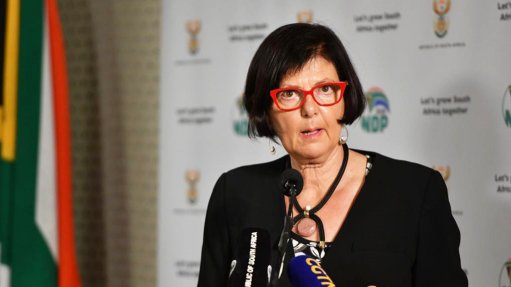
Forestry, Fisheries and the Environment Minister Barbara Creecy
Forestry, Fisheries and the Environment Minister Barbara Creecy reports that the Climate Change Response Fund announced by President Cyril Ramaphosa in his State of the Nation Address (SoNA) last month has been established to support the development of early-warning systems, as well as for adaptation projects to improve the climate resilience of infrastructure amid the growing threats posed by extreme weather events.
Addressing the Presidential Climate Commission (PCC) in Johannesburg, Creecy said that there was also potential to use the fund as a “channel” for financial resources that could be made available to developing countries following the recent operationalisation of a loss and damage fund.
The loss and damage fund was established at the recent COP28 climate talks, held in the United Arab Emirates, where initial funding commitments of $700-million were announced.
In his SoNA speech, Ramaphosa highlighted several recent climate-related disasters, including “devastating wildfires in the Western Cape, destructive floods in KwaZulu-Natal, unbearable heatwaves in the Northern Cape, persistent drought in the Eastern Cape, and intense storms in Gauteng”.
The President said the Climate Change Response Fund would be established to help “build our resilience and respond to the impacts of climate change” but did not provide further details, including on where it would be housed and how it would be funded.
Creecy told the PCC that consideration was being given to hosting the fund at either the Development Bank of Southern Africa or the Industrial Development Corporation, but provided no timeframe for its implementation.
She confirmed that government would set aside some resources to capitalise the fund but indicated that the intention was to also crowd in private finance in a manner similar to the Solidarity Fund that was set up during the Covid-19 pandemic.
Resources secured for the fund would be used to strengthen the country’s early-warning systems for detecting extreme weather events, with Creecy noting that there were growing domestic and international examples of how the use of such systems had been effective in preventing the loss of life.
Adapting InfrastructureProceeds would also be directed towards adapting infrastructure to make it more resilient to events such as wildfires and floods, as well as to safeguard water and food security in the aftermath of weather- related disasters.
Such adaptation efforts, the Minister added, could also help ensure that climate-related loss and damage did not become a “bottomless pit” for municipalities and provinces, which currently relied on disaster-management allocations to finance relief efforts.
Creecy also indicated that the Climate Change Response Fund would complement the Just Energy Transition Implementation Plan (JET-IP), which was focused on climate mitigation investments rather than adaptation.
Ramaphosa announced in his SoNA that financing pledges for the JET-IP had increased from about R170-billion to almost R240-billion, amid growing calls for the proceeds to be used specifically for energy- related or upliftment projects. A significant proportion of the JET-IP transfers to date has been directed to the National Treasury in the form of policy loans that have been used to lower the overall cost of borrowing.